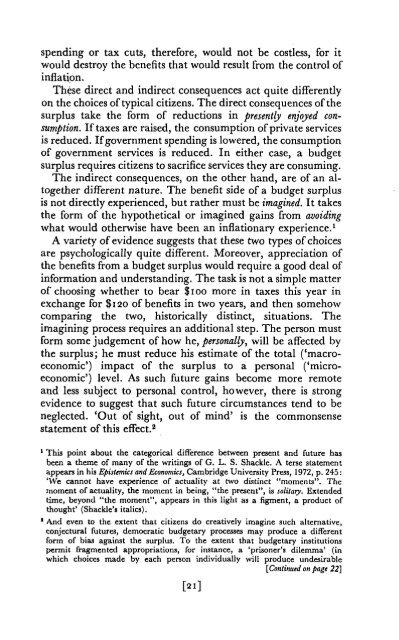THE CONSEQUENCES OF MR KEYNES.pdf - Institute of Economic ...
THE CONSEQUENCES OF MR KEYNES.pdf - Institute of Economic ...
THE CONSEQUENCES OF MR KEYNES.pdf - Institute of Economic ...
Create successful ePaper yourself
Turn your PDF publications into a flip-book with our unique Google optimized e-Paper software.
spending or tax cuts, therefore, would not be costless, for it<br />
would destroy the benefits that would result from the control <strong>of</strong><br />
inflation.<br />
These direct and indirect consequences act quite differently<br />
on the choices <strong>of</strong> typical citizens. The direct consequences <strong>of</strong>the<br />
surplus take the form <strong>of</strong> reductions in presently enjoyed consumption.<br />
If taxes are raised, the consumption <strong>of</strong> private services<br />
is reduced. If government spending is lowered, the consumption<br />
<strong>of</strong> government services is reduced. In either case, a budget<br />
surplus requires citizens to sacrifice services they are consuming.<br />
The indirect consequences, on the other hand, are <strong>of</strong> an altogether<br />
different nature. The benefit side <strong>of</strong> a budget surplus<br />
is not directly experienced, but rather must be imagined. It takes<br />
the form <strong>of</strong> the hypothetical or imagined gains from avoiding<br />
what would otherwise have been an inflationary experience. 1<br />
A variety <strong>of</strong> evidence suggests that these two types <strong>of</strong> choices<br />
are psychologically quite different. Moreover, appreciation <strong>of</strong><br />
the benefits from a budget surplus would require a good deal <strong>of</strong><br />
information and understanding. The task is not a simple matter<br />
<strong>of</strong> choosing whether to bear $ i oo more in taxes this year in<br />
exchange for $120 <strong>of</strong> benefits in two years, and then somehow<br />
comparing the two, historically distinct, situations. The<br />
imagining process requires an additional step. The person must<br />
form some judgement <strong>of</strong> how he, personally, will be affected by<br />
the surplus; he must reduce his estimate <strong>of</strong>the total ('macroeconomic')<br />
impact <strong>of</strong> the surplus to a personal ('microeconomic')<br />
level. As such future gains become more remote<br />
and less subject to personal control, however, there is strong<br />
evidence to suggest that such future circumstances tend to be<br />
neglected. 'Out <strong>of</strong> sight, out <strong>of</strong> mind' is the commonsense<br />
statement <strong>of</strong> this effect. 2<br />
1 This point about the categorical difference between present and future has<br />
been a theme <strong>of</strong> many <strong>of</strong> the writings <strong>of</strong> G. L. S. Shackle. A terse statement<br />
appears in his Epistemics and <strong>Economic</strong>s, Cambridge University Press, 1972, p. 245:<br />
'We cannot have experience <strong>of</strong> actuality at two distinct "moments". The<br />
moment <strong>of</strong> actuality, the moment in being, "the present", is solitary. Extended<br />
time, beyond "the moment", appears in this light as a figment, a product <strong>of</strong><br />
thought' (Shackle's italics).<br />
• And even to the extent that citizens do creatively imagine such alternative,<br />
conjectural futures, democratic budgetary processes may produce a different<br />
form <strong>of</strong> bias against the surplus. To the extent that budgetary institutions<br />
permit fragmented appropriations, for instance, a 'prisoner's dilemma' (in<br />
which choices made by each person individually will produce undesirable<br />
[Continued on page 22]<br />
[21]












